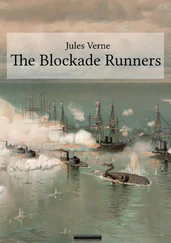“She’s cleared the ice-bank!” shouted Johnson, who had rushed to the fore of the brig.
“Thank God!” answered Hatteras.
The brig was now in the midst of a pond of ice, which hemmed her in on every side, and though her keel was in the water, she could not move; she was immovable, but the icefield moved for her.
“We are drifting, captain!” cried Johnson.
“We must drift,” answered Hatteras; “we can’t help ourselves.”
When daylight came, it was seen that the brig was drifting rapidly northward, along with a submarine current. The floating mass carried the Forward along with it. In case of accident, when the brig might be thrown on her side, or crushed by the pressure of the ice, Hatteras had a quantity of provisions brought up on deck, along with materials for encamping, the clothes and blankets of the crew. Taking example from Captain McClure under similar circumstances, he caused the brig to be surrounded by a belt of hammocks, filled with air, so as to shield her from the thick of the damage; the ice soon accumulated under a temperature of 7 degrees, and the ship was surrounded by a wall of ice, above which her masts only were to be seen. They navigated thus for seven days; Point Albert, the western extremity of New Cornwall, was sighted on the 10th of September, but soon disappeared; from thence the icefield drifted east. Where would it take them to? Where should they stop? Who could tell? The crew waited, and the men folded their arms. At last, on the 15th of September, about three o’clock in the afternoon, the icefield, stopped, probably, by collision with another field, gave a violent shake to the brig, and stood still. Hatteras found himself out of sight of land in latitude 78 degrees 15 minutes and longitude 95 degrees 35 minutes in the midst of the unknown sea, where geographers have placed the Frozen Pole.
CHAPTER XXIV
PREPARATIONS FOR WINTERING
Table of Contents
The southern hemisphere is colder in parallel latitudes than the northern hemisphere; but the temperature of the new continent is still 15 degrees below that of the other parts of the world; and in America the countries known under the name of the Frozen Pole are the most formidable. The average temperature of the year is 2 degrees below zero. Scientific men, and Dr. Clawbonny amongst them, explain the fact in the following way. According to them, the prevailing winds of the northern regions of America blow from the southwest; they come from the Pacific Ocean with an equal and bearable temperature; but in order to reach the Arctic Seas they have to cross the immense American territory, covered with snow, they get cold by contact with it, and then cover the hyperborean regions with their frigid violence. Hatteras found himself at the Frozen Pole beyond the countries seen by his predecessors; he, therefore, expected a terrible winter on a ship lost in the midst of the ice with a crew nearly in revolt. He resolved to face these dangers with his accustomed energy. He began by taking, with the help of Johnson’s experience, all the measures necessary for wintering. According to his calculations he had been dragged two hundred and fifty miles beyond New Cornwall, the last country discovered; he was clasped in an icefield as securely as in a bed of granite, and no power on earth could extricate him.
There no longer existed a drop of water in the vast seas over which the Arctic winter reigned. Icefields extended as far as the eye could reach, bristling with icebergs, and the Forward was sheltered by three of the highest on three points of the compass; the southeast wind alone could reach her. If instead of icebergs there had been rocks, verdure instead of snow, and the sea in its liquid state again, the brig would have been safely anchored in a pretty bay sheltered from the worst winds. But in such a latitude it was a miserable state of things. They were obliged to fasten the brig by means of her anchors, notwithstanding her immovability; they were obliged to prepare for the submarine currents and the breaking up of the ice. When Johnson heard where they were, he took the greatest precautions in getting everything ready for wintering.
“It’s the captain’s usual luck,” said he to the doctor; “we’ve got nipped in the most disagreeable point of the whole glove! Never mind; we’ll get out of it!”
As to the doctor, he was delighted at the situation. He would not have changed it for any other! A winter at the Frozen Pole seemed to him desirable. The crew were set to work at the sails, which were not taken down, and put into the hold, as the first people who wintered in these regions had thought prudent; they were folded up in their cases, and the ice soon made them an impervious envelope. The crow’s nest, too, remained in its place, serving as a nautical observatory; the rigging alone was taken away. It became necessary to cut away the part of the field that surrounded the brig, which began to suffer from the pressure. It was a long and painful work. In a few days the keel was cleared, and on examination was found to have suffered little, thanks to the solidity of its construction, only its copper plating was almost all torn off. When the ship was once liberated she rose at least nine inches; the crew then bevelled the ice in the shape of the keel, and the field formed again under the brig, and offered sufficient opposition to pressure from without. The doctor helped in all this work; he used the ice-knife skilfully; he incited the sailors by his happy disposition. He instructed himself and others, and was delighted to find the ice under the ship.
“It’s a very good precaution!” said he.
“We couldn’t do without it, Mr. Clawbonny,” said Johnson. “Now we can raise a snow-wall as high as the gunwale, and if we like we can make it ten feet thick, for we’ve plenty of materials.”
“That’s an excellent idea,” answered the doctor. “Snow is a bad conductor of heat; it reflects it instead of absorbing it, and the heat of the interior does not escape.”
“That’s true,” said Johnson. “We shall raise a fortification against the cold, and against animals too, if they take it into their heads to pay us a visit; when the work is done it will answer, I can tell you. We shall make two flights of steps in the snow, one from the ship and the other from outside; when once we’ve cut out the steps we shall pour water over them, and it will make them as hard as rock. We shall have a royal staircase.”
“It’s a good thing that cold makes ice and snow, and so gives us the means of protecting ourselves against it. I don’t know what we should do if it did not.”
A roofing of tarred cloth was spread over the deck and descended to the sides of the brig. It was thus sheltered from all outside impression, and made a capital promenade; it was covered with two feet and a-half of snow, which was beaten down till it became very hard, and above that they put a layer of sand, completely macadamising it.
“With a few trees I should imagine myself in Hyde Park,” said the doctor, “or in one of the hanging gardens of Babylon.”
They made a hole at a short distance from the brig; it was round, like a well; they broke the ice every morning. This well was useful in case of fire or for the frequent baths ordered to keep the crew in health. In order to spare their fuel, they drew the water from a greater depth by means of an apparatus invented by a Frenchman, Francois Arago. Generally, when a ship is wintering, all the objects which encumber her are placed in magazines on the coast, but it was impossible to do this in the midst of an icefield. Every precaution was taken against cold and damp; men have been known to resist the cold and succumb to damp; therefore both had to be guarded against. The Forward had been built expressly for these regions, and the common room was wisely arranged. They had made war on the corners, where damp takes refuge at first. If it had been quite circular it would have done better, but warmed by a vast stove and well ventilated, it was very comfortable; the walls were lined with buckskins and not with woollen materials, for wool condenses the vapours and impregnates the atmosphere with damp. The partitions were taken down in the poop, and the officers had a large comfortable room, warmed by a stove. Both this room and that of the crew had a sort of antechamber, which prevented all direct communication with the exterior, and prevented the heat going out; it also made the crew pass more gradually from one temperature to another. They left their snow-covered garments in these antechambers, and scraped their feet on scrapers put there on purpose to prevent any unhealthy element getting in.
Читать дальше












